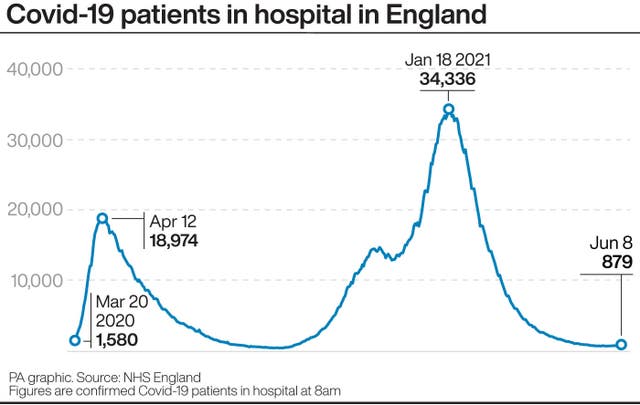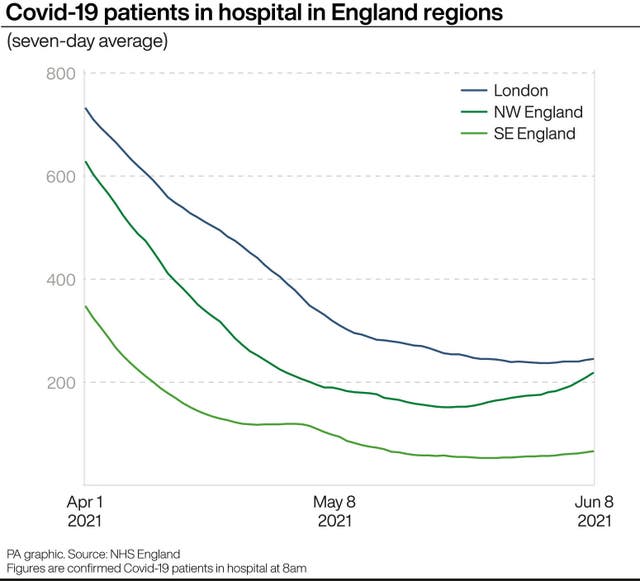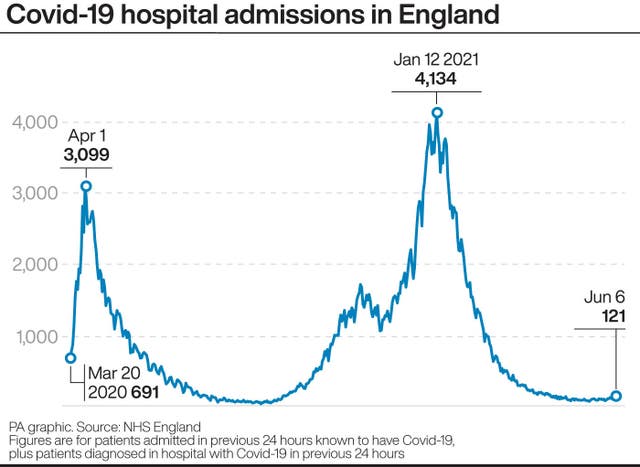Covid-19 patient numbers rising in more regions of England, figures show
North-west England is now averaging the highest number of patients since April.

The number of people in hospital with Covid-19 in England is now a fifth higher than it was at the end of the second wave of the virus, with more regions reporting a rise in patients, new figures show.
It comes as Government ministers are reviewing the latest data on Covid-19 cases and the amount of people being taken to hospital to decide whether the planned easing of social restrictions in England on June 21 will go ahead, with Prime Minister Boris Johnson due to announce a decision on Monday.
A total of 879 patients with Covid-19 were in hospital in England as of 8am on June 8, according to NHS England.
This is up from 776 one week earlier – a rise of 13%.
It is also up 20% from a low of 730 patients on May 22.

Patient numbers are not increasing steadily, with the total sometimes falling slightly one day before jumping again the next.
But even when using a seven-day average to smooth out these kinds of fluctuations, the trend is now upwards.
Analysis by the PA news agency shows that the average number of patients in hospital with Covid-19 stood at 816 on June 8, up week-on-week from 755 (a rise of 8%), itself just above the post-second wave low of 753.
These figures are still well below the second-wave peak, when the number of patients reached a record high average of 33,594 on January 22.
The upwards trend is also not being reflected in every region of England, with the Midlands currently averaging 126 patients, down 7% week-on-week, and the combined region of north-east England and Yorkshire averaging 93, down 3%.
In south-west England the average is 16, unchanged from one week earlier.
All other regions are recording an increase, however.

North-west England is now averaging 216 hospital patients with Covid-19, up week-on-week by 24% and the highest number since April 27.
In London, the average currently stands at 243, up 3% week-on-week to where it last stood on May 25.
South-east England is averaging 65 patients, up from 56 a week earlier to the highest since May 11.
And eastern England is averaging 57 patients, up from 44 to the highest since May 18.
Hospital admissions of patients with Covid-19 in England are also increasing, NHS England figures show.
A total of 121 admissions were recorded on June 6, the highest number since April 27.
Average daily admissions are back above 100 for the first time since April 29.

The rise in hospital numbers comes as the new wave of Covid-19 infections continues to spread, driven by cases of the Delta variant of coronavirus that originated in India.
Covid-19 case rates are currently rising in four out of five local areas of England – the highest proportion since early January.
The overall rate for England is currently 47.5 cases per 100,000 people, up week-on-week from 31.1, and the highest since the end of March.
Health Secretary Matt Hancock said on Tuesday there was a “challenging decision” to be made over the further lifting of Covid restrictions in England on June 21.
Chancellor Rishi Sunak is willing to accept a short delay to the final step of the road map, it is understood, with a Whitehall source pointing towards the Treasury having gone “long” on emergency coronavirus support packages in the Budget to cover the possibility of a delay to the plans.
The Government has said the decision to ease restrictions in England on June 21 will be based on four tests.
These are: whether the vaccine rollout is continuing successfully; if evidence shows vaccines are reducing hospital cases and deaths among people who have been vaccinated; that infection rates are not risking a surge in hospital cases that would put unsustainable pressure on the NHS; and that the Government’s assessment of the risks has not been fundamentally changed by new variants of concern.





